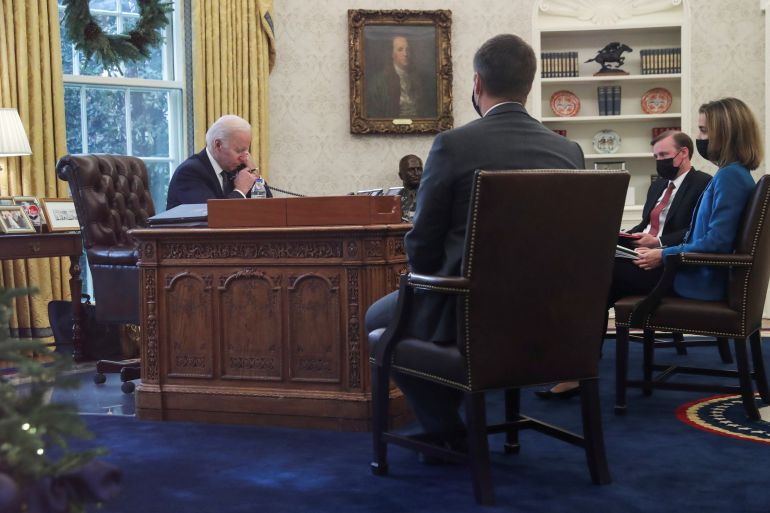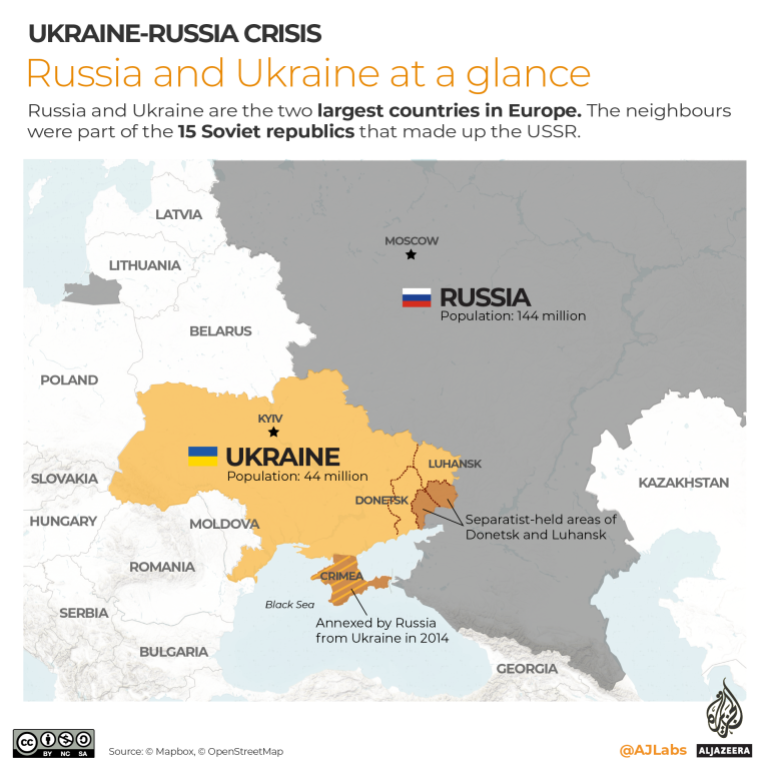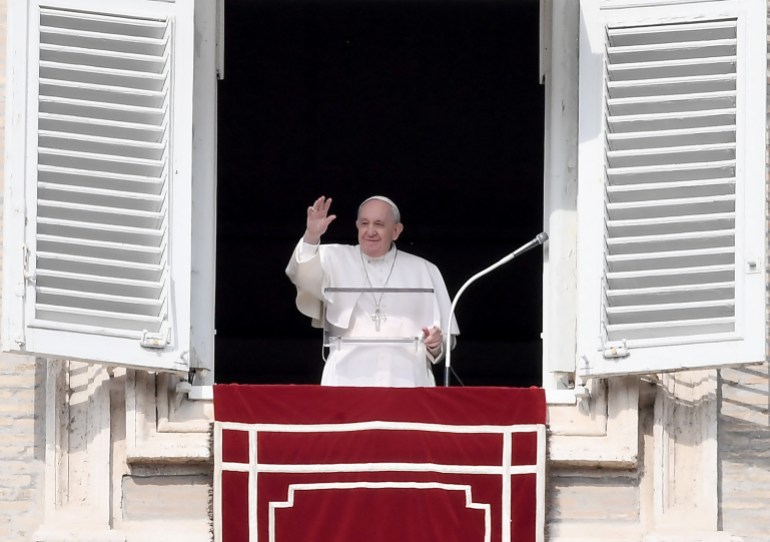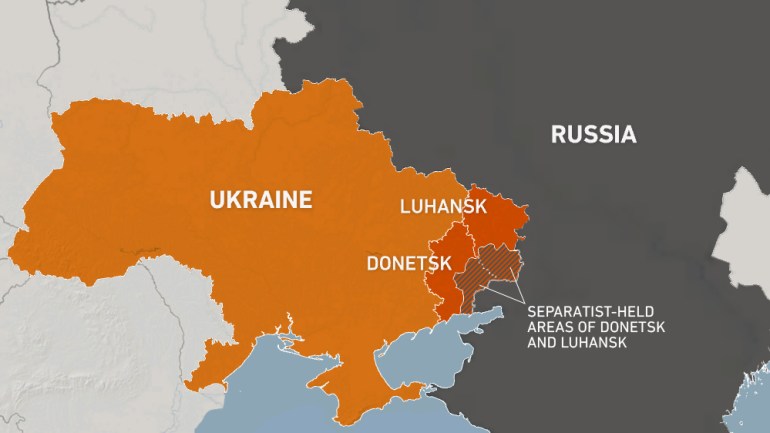Latest updates: Biden, Zelenskyy agree to pursue diplomacy
Ukraine news from February 13: US and Ukraine leaders agree in phone call on both the carrot and stick in response to Russian military buildup, White House says.

Russia could invade Ukraine at any time and might create a surprise pretext for an attack, the US national security adviser warned on Sunday, reaffirming a pledge to defend “every inch” of NATO territory.
Russia has more than 100,000 troops massed near Ukraine, which is not part of the Atlantic military alliance, and Washington – while keeping open the diplomatic channels that have so far failed to ease the crisis – has repeatedly said an invasion is imminent.
Keep reading
list of 4 itemsAmericans should leave Ukraine within 48 hours, White House warns
Airlines review services to Ukraine amid threat of war
Ukraine: Rising tensions put Crimean Tatar Muslims at risk again
Moscow denies any such plans and has accused the West of “hysteria”.
This live blog is now closed, thanks for joining us. Here are the updates for February 13.
Ukraine leader invites Biden to visit Kyiv in ‘coming days’
Ukrainian leader Volodymyr Zelenskyy invited US President Joe Biden to visit Kyiv to show Washington’s support in the face of a feared Russian invasion.
“I am convinced that your visit to Kyiv in the coming days… would be a powerful signal and help stabilise the situation,” the presidency quoted Zelenskyy as telling Biden in a phone call earlier on Sunday.
Airlines review services to Ukraine amid threat of war
Some airlines have canceled or diverted flights to Ukraine amid warnings from the West that an invasion by Russia is imminent as Kyiv says it will keep its airspace open.
Russia denies it intends to invade Ukraine despite massing tens of thousands of troops near the Ukrainian border and denouncing the West of “peak hysteria”.
A call between US President Joe Biden and Russian President Vladimir Putin failed to result in a breakthrough on Saturday, with the US warning Russia of crippling sanctions for military aggression.
Read more here.
Biden, Zelenskyy pursue ‘diplomacy and deterrence’ in Ukraine crisis
US President Joe Biden spoke at length with Ukrainian counterpart Volodymyr Zelenskyy about Russia’s military buildup along Ukraine’s borders, with the pair agreeing on the need to pursue “diplomacy and deterrence,” the White House said.
“The two leaders agreed on the importance of continuing to pursue diplomacy and deterrence in response to Russia’s military build-up on Ukraine’s borders,” according to a readout of the roughly 50-minute call.
With Western fears growing that Russia is about to invade the ex-Soviet state, the White House added that Biden “made clear that the United States would respond swiftly and decisively, together with its allies and partners, to any further Russian aggression against Ukraine”.
British defence minister cancels holiday as Ukraine crisis deepens
British defence minister Ben Wallace said he was returning from a holiday in Europe after one day to deal with what he called the “worsening” crisis in Ukraine as he warned that Russia could invade any time.
Wallace had planned to spend a long weekend abroad with his family after visiting Moscow last week for diplomatic talks. ITV News said the minister announced the change of plans after one of its journalists spotted him at a European resort and the broadcaster sought comment from the defence ministry.
“Having returned from Moscow early on Saturday morning and because we are concerned about the worsening situation in Ukraine I have cancelled a planned long weekend abroad with my family and will be returning,” Wallace said on Twitter.
Ukraine receives anti-aircraft missiles from Lithuania
Ukraine has received a consignment of Stinger anti-aircraft missile systems and ammunition by plane from Lithuania, the defense ministry in Kyiv said.
Earlier in the day, two other planes delivered about 180 tonnes of ammunition from the United States, Defence Minister Oleksii Reznikov said. Ukraine had so far received almost 1,500 tonnes of ammunition delivered on 17 flights, he said on Twitter.
Military officials say Ukraine has significantly strengthened its armed forces with the help of allies, equipping the army, in particular, with American and British anti-tank systems and Turkish drones.
Poland preparing to take in refugees from Ukraine
Poland is preparing to take in refugees from neighbouring Ukraine in the event of a Russian incursion, Interior Minister Mariusz Kaminski said.
Warsaw is considering a number of scenarios. “One of them is the preparations of the heads of the regional administrations related to the possible influx of refugees from Ukraine who, due to a possible conflict, may seek a safe haven in our country,” Kaminski wrote on Twitter.
Ukrainian citizens are currently allowed to enter Poland and the Schengen area for tourist purposes without a visa for up to 90 days.
Poland is also home to many migrant workers from Ukraine. According to the Polish Office for Foreigners, more than 300,000 people from Ukraine held residence permits in December, mostly for a limited period of three years.
White House adviser says US to keep sharing intelligence on Russia’s Ukraine actions
White House National Security Adviser Jake Sullivan has said that a Russian invasion could begin any day and the United States will continue to share intelligence with the world to deny Moscow the ability to stage a surprise “false flag” operation to launch an attack.
Sullivan, speaking on CNN’s “State of the Union” program, declined to say whether US intelligence agencies believe that Russia is considering an attack on Wednesday, as some reports suggest.
“We cannot perfectly predict the day, but we have now been saying for some time that we are in the window, and an invasion could begin – a major military action could begin – by Russia in Ukraine any day now. That includes this coming week before the end of the Olympics,” Sullivan said.
Biden and Ukraine’s Zelenskyy to discuss security
Ukraine’s President Volodymyr Zelenskiy and US President Joe Biden will speak on Sunday, the spokesman for Ukrainian leader’s said.
Sergii Nykyforov said on Facebook the two leaders “would discuss the security situation and ongoing diplomatic de-escalation efforts”.
Pentagon cannot confirm reports of a Russian plan to invade Ukraine on Wednesday
Pentagon spokesperson John Kirby has said that he cannot confirm reports that Russia plans to invade Ukraine on Wednesday.
“I’m not in a position to confirm those reports,” Kirby said during an interview on “Fox News Sunday”, adding that the United States believes that a “major military action could happen any day now.”
Russia has ‘responsibility’ for risk of ‘war’: German president
Russia carries the “responsibility” for the possibility of war in Ukraine, the German President Frank-Walter Steinmeier said.
There was “the danger of a military conflict, of war in eastern Europe and Russia carries the responsibility for that,” Steinmeier said in a speech to mark his reelection.
Situation ‘critical’ as tensions with Russia over Ukraine rise: German gov’t
Tensions between Russia and Ukraine have reached a “critical” point, a German government source said Sunday, the eve of Chancellor Scholz’s departure for Kyiv and then Moscow.
“Our concerns have grown… we asses the situation as very critical, very dangerous”, the source told members of the press, as fears grow that a Russian invasion of Ukraine is imminent.
Moscow voices concern over OSCE moves to ‘relocate’ Ukraine staff
Russia said it was concerned by the decision of the Organization for Security and Co-operation in Europe to relocate some of their Ukraine-based monitors.
The OSCE “informed the participating states of the decision by ‘a number of countries’ to relocate their national staff of the OSCE Special Monitoring Mission to Ukraine ‘due to deteriorating security conditions'”, foreign ministry spokeswoman Maria Zakharova said.
“These decisions cannot but cause our serious concern.”
The OSCE has served as the world’s eyes and ears for the eight-year conflict across Ukraine’s Russian-backed separatist east that has claimed more than 14,000 lives.
Germany’s vice chancellor says Europe may be on the ‘verge of war’
Robert Habeck, Germany’s vice chancellor and economics minister, has warned that Europe may be on the verge of war.
Speaking in an interview with broadcaster RTL/NTV, Habeck, without elaborating, pointed to large armed forces facing each other.
“We may be on the verge of war in Europe,” he said. “It is absolutely oppressive and threatening.”

Timeline: How the Ukraine-Russia crisis reached the brink of war
Tensions over the Ukraine-Russia crisis have been simmering for more than two months, with diplomatic efforts to resolve the issue showing little sign of progress.
But how did we get to this point?
Here is a timeline of the main events
Pope Francis calls silent prayer for Ukraine
Addressing thousands of people in Rome’s St Peter’s square, Pope Francis invoked a silent prayer for Ukraine appealing to politicians’ consciences to seek peace.
“The news from Ukraine is very worrying,” said Francis. “I entrust every effort for peace to the intercession of the Virgin Mary and the consciences of responsible politicians,” he said during his weekly blessing and message. “Let us pray in silence,” he said. The crowd went quiet for about half a minute.

Germany hopes for insight into Putin’s aims: Report
Germany does not expect concrete results from Chancellor Olaf Scholz’s meeting with Putin set for Tuesday, but hopes to get a glimpse of what the Russian leader hopes to achieve with the military build-up on the border of Ukraine, a German government source told Reuters.
The source said Scholz would make it clear to Putin that Western partners stood united in their stance that any aggression would prompt “painful, considerable sanctions” on Russia.
“He will also underscore that we are not just ready to dialogue, but we insist on de-escalation and the withdrawal of the troop build-up that can only be interpreted as a threat,” the source said.
Not worried about sanctions: Russian diplomat
Moscow “doesn’t give a s***” about the risk of Western sanctions, Russia’s outspoken ambassador to Sweden told a Swedish newspaper.
“Excuse my language, but we don’t give a s*** about all their sanctions”, Viktor Tatarintsev told the Aftonbladet newspaper. “We have already had so many sanctions and, in that sense, they’ve had a positive effect on our economy and agriculture,” said the veteran diplomat.
“New sanctions are nothing positive but not as bad as the West makes it sound”, he added.
No point in closing Ukraine’s airspace: Adviser
Ukraine sees no point in closing its airspace, an adviser to the Ukrainian president’s chief of staff told Reuters.
“The most important point is that Ukraine itself sees no point in closing the sky. This is nonsense. And, in my opinion, it somewhat resembles a kind of partial blockade,” said Mykhailo Podolyak.
His comments came after Dutch carrier KLM said it would stop flying to Ukraine immediately, while Ukraine’s SkyUp airline said it had to divert one of its planes after the owner of the leased aircraft barred the flight from entering Ukrainian airspace.
‘A massive strategic setback’
US State Department’s Derek Chollet has elaborated on what would be the “swifts and severe costs” for Russia if it decides to invade Ukraine.
The US and its allies would infer “quite considerable” and “crippling” sanctions that would bring “tremendous economic hardship upon the Russians”, Chollet said. An invasion, he told the BBC, would also not deter NATO from boosting its military capacity on its eastern borders.
Such actions would be “a massive strategic setback” for Moscow as it would further isolate it from Europe while strengthening NATO’s build-up.
A simple guide to the Ukraine-Russia crisis
Why are Ukraine’s NATO ambitions so controversial? What does Russia want? Will Ukraine join NATO? And will there be all-out war?
Here are five things you should know about what’s happening now and what could come next.
‘Not tough enough’: British minister
British Defence Secretary Ben Wallace has compared Western diplomatic efforts to head off a Russian invasion of Ukraine to the appeasement of Nazi Germany ahead of World War II.
Wallace told the Sunday Times that Russian President Putin could send his massed troops into Ukraine “at any time” and suggested unnamed Western countries were not being tough enough with Moscow.
“It may be that he (Putin) just switches off his tanks and we all go home but there is a whiff of Munich in the air from some in the West,” Wallace said.
The 1938 Munich Agreement handed Nazi Germany parts of Czechoslovakia in a failed bid to head off major conflict in Europe.
Diplomacy ‘doesn’t seem to be going anywhere’: AJ correspondent
Al Jazeera’s Natacha Butler, reporting from Kyiv, said that after a flurry of diplomacy with Russia’s President Putin speaking to his US and French counterparts, “no real progress seems to have been made”.
“A lot of conversations are happening but there doesn’t seem to be any form of breakthrough. You still have the two sides that are deeply entrenched in their positions,” she said.
Putin told Biden that the US has failed to take Russia’s main concerns such as NATO expansion into account, while Western powers have said Russia has to show signs it is ready to deescalate and solve the crisis diplomatically.
US staff of OSCE starts pullout from Donetsk: Reuters
A Reuters witness says US staff at the Organisation for Security and Cooperation in Europe – the world’s largest regional security institution – have started to withdraw by car from the rebel-held city of Donetsk in eastern Ukraine.
The OCSE’s special monitoring mission has been operating in the area since 2014.

Australia suspends operations at Ukraine embassy
The Australian government has temporarily suspended operations at its Kyiv embassy as fears of a Russian invasion rise.
“Given the deteriorating security situation caused by the build-up of Russian troops on Ukraine’s border, the Government has directed the departure of staff at the Australian Embassy in Kyiv and temporarily suspended operations at our Embassy in Kyiv,” foreign minister Marise Payne said in a Sunday statement.
Payne said that the embassy’s operations would be temporarily moved to the Ukrainian city of Lviv, located further west, near the border with Poland.
US: The ‘diplomatic path remains open’
Blinken has reiterated that a diplomatic solution remained possible, if Moscow de-escalates.
“The diplomatic path remains open. The way for Moscow to show that it wants to pursue that path is simple. It should de-escalate, rather than escalate,” Blinken said.
Blinken says embassy drawdown prudent given risk of Russian invasion
The US secretary of state says the risk of Russian military action in Ukraine is high enough to justify the departure of much of the staff at the US embassy in Kyiv, which the Department of State announced on Saturday.
“We ordered the departure of most of the Americans still at the US embassy in Kyiv. The risk of Russian military action is high enough and the threat is imminent enough that this is the prudent thing to do,” Blinken told a news conference in Honolulu.
Most embassy staff were ordered to leave Ukraine immediately, with the department saying it appeared increasingly likely that the situation is headed towards “some kind of active conflict”.
You can see updates from Saturday, February 12 here.